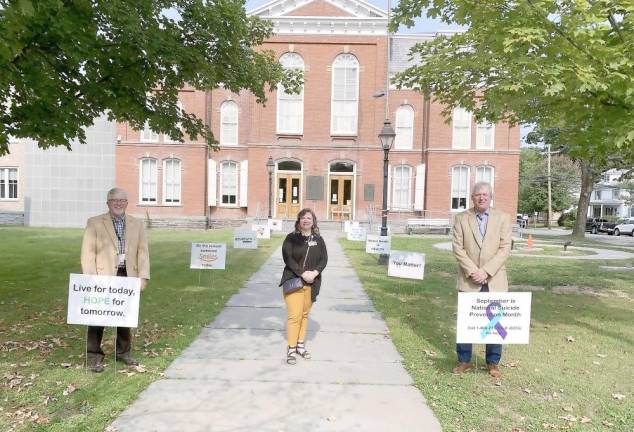Know the three suicide warning signs
Milford. The Pike County Commissioners are raising awareness during Suicide Prevention Month.

Suicide ranks as the 10th leading cause of death in the United States across all age groups. To raise awareness of this important issue, the Pike County Commissioners recently passed a resolution recognizing September as Suicide Prevention Month, and helped to install educational signs on the lawn of the Pike County Courthouse to offer hope and resources to people in need.
“It’s important for people with mental health issues or depression to know that help is available, and for family and friends to know the warning signs of suicide and what to do if you see these signs,” say the Commissioners.
According to Larissa Kimmel, the System of Care Coordinator for Carbon, Monroe and Pike Counties, three areas we can observe in others may provide clues.
1. Talk: Direct or indirect statements about not wanting to be alive like: being a burden to loved ones, wanting to go to sleep and never wake up, feeling trapped, having no reason to live, talking about a plan to kill themselves.
2. Mood: Depression, anxiety, loss of interest, irritability and rage. Moods that may be uncharacteristic of them and long lasting.
3. Behavior: Withdrawing from activities they have always enjoyed, acting reckless, increased use of drugs or alcohol, giving away prized possessions, sleeping too much or too little, buying a weapon.
“When we notice these things it is important to talk with them about what you are seeing and listen to what they have to say,” says Kimmel. “Listening is the simplest thing any of us can do to allow a person to feel heard and valued. Let them know it is okay to not feel okay and that they are not alone. Give them options of how to get help including a local counselor or doctor, a crisis hotline, or a connection with someone they trust.”
Carbon, Monroe, and Pike counties have local crisis services called New Perspectives, which specializes in connecting people in the Poconos region with life-saving resources backed by expert knowledge of services, interventions and resources. Call 570-992-0879 to speak with a crisis worker who can direct a person to the help they need. But in some cases, if the circumstance is urgent, call 911.
For more information on New Perspectives visit rhd.org/new-perspectives.